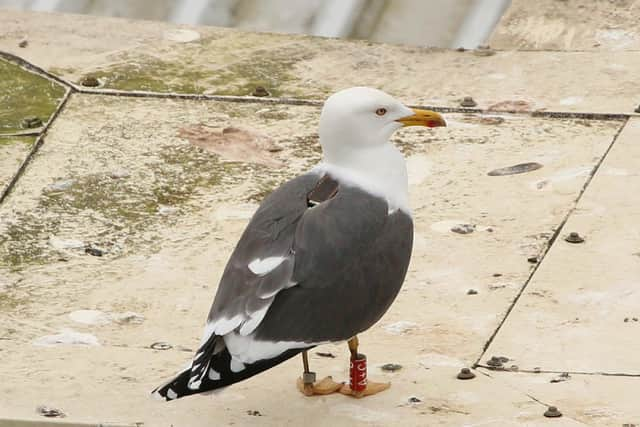Britain's seagull population is now brainier than ever
and live on Freeview channel 276
Experts at the University of Bristol examined gull patterns at three sites in the city, comparing how the birds act when people provide food sources.
GPS backpacks were fitted to twelve Lesser Black-backed Gulls and observations were carried out.
Advertisement
Hide AdAdvertisement
Hide AdThe team found the birds' foraging patterns closely matched the timing of breaks at schools - when kids are out and about with chocolate and crisps.


The birds had also learned - the opening and closing times of a waste centre.
But it was found that the gulls' activity in the park appeared to correspond with the availability of natural food sources.
In-depth research has now found that this is the case and urban gulls have adapted their behaviour to match human activity and find food.
Advertisement
Hide AdAdvertisement
Hide AdThe findings suggest gulls may have the behavioural flexibility to adapt their foraging behaviour to human schedules, experts said.
This trait then helps them to thrive in cities where food availability often fluctuates according to patterns of activity, which can follow a daily or weekly cycle.
Dr Anouk Spelt, lead author of the paper published in Ibis, the International Journal of Avian Science, said: "Our first day at the school, the students were excited to tell us about the gulls visiting their school at lunch time.
"Indeed, our data showed that gulls were not only present in high numbers during lunch time to feed on leftovers, but also just before the start of the school and during the first break when students had their snack.
Advertisement
Hide AdAdvertisement
Hide Ad"Similarly, at the waste centre the gulls were present in higher numbers on weekdays when the centre was open and trucks were unloading food waste.
"Although everybody has experienced or seen gulls stealing food from people in parks, our gulls mainly went to park first thing in the morning and this may be because earthworms and insects are present in higher numbers during these early hours."
Dr Shane Windsor, co-author, said: "With this study in Bristol we have shown that gulls in cities are able to adapt their foraging schedule to make best use of food resources depending on their availability.
"Some gulls even used all three feeding grounds in the same day, suggesting they might track the availability to optimise their energy intake.
Advertisement
Hide AdAdvertisement
Hide Ad"These results highlight the behavioural flexibility of gulls and their ability to adapt to the artificial environments and time schedules of urban living."
The research was carried out by a team of scientists from the university's Faculties of Engineering and Life Sciences
It is thanks to our loyal readers that we can continue to provide the trusted news, analysis and insight that matters to you. For unlimited access to our unrivalled local reporting, you can take out a subscription here and help support the work of our dedicated team of reporters.